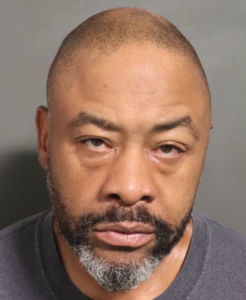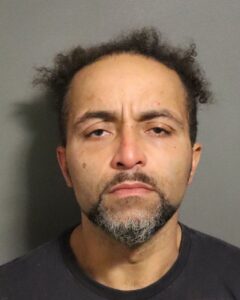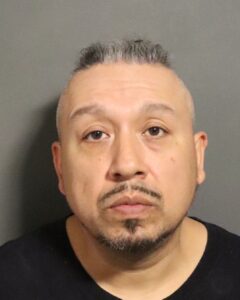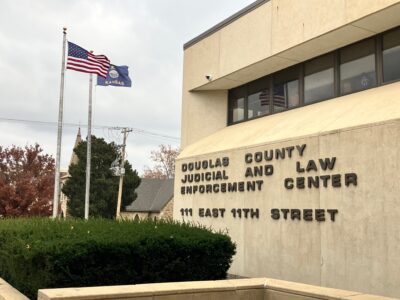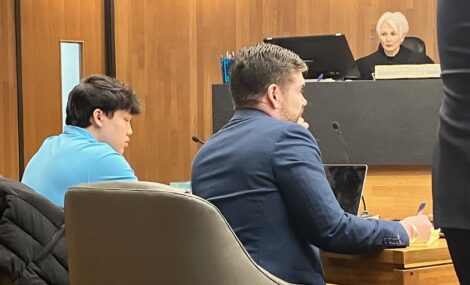Lawrence murder defendant tells police he walked in on body, then they accuse him, video shows
Also, detectives recount searching defendant’s apartment, collecting sock, sandals

photo by: Mackenzie Clark
Rontarus Washington Jr., center, stands as the jury enters his trial on Wednesday, Sept. 25, 2019. Leaning down next to him is his defense attorney, Angela Keck, and to her right is her co-counsel Adam Hall. Douglas County District Court Judge James McCabria is shown in the background.
Story updated at 8:34 p.m. Wednesday, Sept. 25:
Rontarus Washington Jr. told police he knew that a woman murdered in his apartment complex had to have been beaten or stabbed to death. There was blood everywhere, and the images haunted him in his sleep.
He had seen someone get shot, then-18-year-old Washington told detectives during an interview, and he knew that wasn’t what killed the woman. His cousin had been beaten to death with brass knuckles, “and he was bloody,” Washington said. If someone was strangled, there wouldn’t be much blood, Washington said — so she had to have been beaten, stabbed or cut.
Nearly five years after 19-year-old Justina Altamirano Mosso was found dead in her apartment bathroom, Washington, the man police have accused of killing her, is facing trial. On Wednesday, the jury watched about two and a half hours of his videotaped interview with Lawrence Police Department detectives.

photo by: Contributed photos
Photos of Justina Altamirano Mosso, 19, provided by the Lawrence Police Department.
Washington, now 23, is charged with first-degree murder and aggravated burglary in connection with Mosso’s Nov. 7, 2014 death at Lawrence’s Cedarwood Apartments, 1727 W. 24th St. His trial began Sept. 9 in Douglas County District Court after being delayed several times, and he’s been in custody for about four years and eight months.
Mosso and Washington both lived on the building’s third floor on opposite ends of the hallway — Mosso in studio apartment No. 13, the southeasternmost unit, and Washington in northwesternmost No. 10. Mosso had lived in No. 13 with her husband, Felipe Cantu Ruiz, until a few weeks before her death when she moved out because, as Cantu Ruiz has testified, the marriage was not good and she had been seeing someone else.
That Friday, Nov. 7, 2014, Washington was about to leave with his girlfriend’s uncle, “Uncle Jot,” but ran back upstairs to make sure his door was locked. He thought he heard someone — either two people or one large person — running down the opposite stairwell on the building’s south end.
Then he noticed the door to No. 13 was wide open, and he could see sunlight streaming into the hallway through the apartment’s window, he told police. He went in to try to see what was going on.
• • •
Lawrence Police Department Detectives Sam Harvey and Jamie Lawson went to Washington’s apartment around 9 or 10 a.m. Monday, Nov. 24, 2014. They asked him to come with them to LPD’s Investigations and Training Center, 4820 Bob Billings Parkway, to answer some more questions uninterrupted.
The jury was shown about two and a half hours of video footage from Washington’s interview with police. The judge warned that some parts had been redacted or removed and that jurors were not to concern themselves with that. It was not clear from the footage how much had been removed, but some documents in the case file indicate the interview lasted six hours.
Early in the interview, detectives told Washington he wasn’t in trouble for anything. They said that he’d been “extremely helpful,” their best witness so far in the investigation — they wanted to clear Washington and just find out any information he knew. They didn’t “have any feeling you’re involved in regards to the female or anything like that,” one of the detectives told him, and they knew he was a “good guy.”

photo by: Mackenzie Clark
From left, defense attorneys Adam Hall and Angela Keck confer with Douglas County District Court Judge James McCabria and prosecutor C.J. Rieg during trial for Rontarus Washington Jr., seated in the foreground, on Sept. 25, 2019.
Washington — at times difficult to follow as he jumped between topics, as he had in other interviews played for the jury — told police he saw Cantu Ruiz arguing with a woman in the apartment building’s parking lot that Friday afternoon. He said he saw him grab the woman and shake her by the shoulders. The woman was Mosso, based on previous testimony in the case.
When he saw the door to No. 13 open, he tried to call out to anyone inside, he said. He got no response, so he stepped inside. He drew his path for detectives: in through the open front door, past the refrigerator in the kitchenette, past the table just inside the bedroom/living room area, past the bed and toward the back corner of the apartment, as he noted that all the drawers to the dresser were open.
He walked back around to the other side of the bed and looked up into the bathroom to see blood pooling around Mosso’s body on the bathroom floor, her legs splayed on either side of the toilet and her head lying against the edge of the tub. He said he couldn’t see any injuries — just blood. His description was consistent with photos and testimony shared during the trial.
Then he turned and “ran out of there like a little (expletive).” He said he didn’t even close the door behind him.
“I never told nobody about it, sir, because it be haunting me in my sleep,” Washington told the detectives.

photo by: Mackenzie Clark
From left, Rontarus Washington Jr. listens as his defense attorneys, Angela Keck and Adam Hall, discuss the trial with the judge on Wednesday, Sept. 25, 2019, in Douglas County District Court.
He’d told some lies in previous interviews because he wasn’t comfortable around any of the other officers he’d spoken with, he said, but Harvey and Lawson made him feel comfortable enough to share the truth. And he said he wanted to help in any way that he could, including allowing them to collect his DNA.
“I don’t want to make you feel like I’m hiding anything, because I’m not hiding anything except for the stuff I just told y’all,” Washington said.
About halfway into the second hour of the interview portion shown to the jury, detectives told Washington he was not under arrest but proceeded to read him his “rights,” meaning his Miranda rights.
The detectives told Washington that his entering apartment No. 13 was very important information, and then one posed a theory: He said he didn’t believe whoever killed Mosso intended for it to happen. Washington interjects that he had a different opinion and “it looked like they were trying to do it.”
The detective said he thought someone walked into the apartment, then panicked because they knew this girl was going to make noise and they wanted the noise to stop. He told Washington that he believed that was exactly the position he was in. Either he’d intended to do this or it was accidental, the detective said, but he “took care of her” because he was scared.
“No sir, I did not kill this girl,” Washington said. “No sir, I didn’t have nothing to do with this girl’s murder.” He got upset because he had told them everything he knew and now they were trying to “put it on” him.
• • •
In the meantime, other detectives were securing search warrants for Washington’s apartment and fingerprints.
Former Lawrence Police Department Detective Zachariah Thomas continued his testimony Wednesday morning, discussing his role in investigating the crime scene and then searching Washington’s apartment that same Monday, Nov. 24, 2014.
On Tuesday, he had begun to talk about what happened when he sprayed the hallway outside Mosso’s apartment, No. 13, with leucocrystal violet, or LCV — a chemical that can make blood light up purple, even if it’s not visible to the naked eye. Once he sprayed the dark carpet in the hallway, a dark pattern of spots that looked to be footprints appeared, but they didn’t turn purple — they turned a darker purple or black color.
The pattern led down toward the opposite end of the hallway, to No. 10. But Thomas said he tested some of the spots near the door to No. 13, and they did not test positive for blood.
However, he said he later conducted an experiment to see how the LCV would react with just blood, then a mixture of blood and bleach. It was not clear from his testimony what blood he had used for the experiment. Bleach alone did not show up differently when sprayed with LCV, but the blood and bleach mixture showed up dark purple or black in his experiment.

photo by: Mackenzie Clark
From left, defense attorneys Adam Hall and Angela Keck discuss Keck’s objection to some of the state’s exhibits with prosecutor C.J. Rieg and Douglas County District Court Judge James McCabria, Wednesday, Sept. 25, 2019.
One of Washington’s defense attorneys, Angela Keck, objected to the state’s use of the experiment as an exhibit, but the judge allowed it.
• • •
Thomas and then-Detective David Axman searched Washington’s apartment to look for various items such as knives, any trace evidence of the victim or her purse, and items that may have had blood transfer on them.
Thomas walked the jury through their search, noting several items that were collected for further testing. Among the items, detectives collected a few knives from the kitchen. They also collected a white sock from a hallway closet because it tested positive for blood, Thomas said.
Inside the closet in the bedroom of apartment No. 10, detectives found a suitcase that contained a pair of orange Nike sliders. According to previous testimony, the sliders are believed to have left a footwear impression in blood on a piece of paper outside of the bathroom where Mosso’s body was discovered.
In her cross-examination of Thomas, Keck asked whether any blood or splatter had been found on the tops of the sliders. He said there was nothing on the tops.
Axman also returned to testify about another search a couple of days later. On Wednesday, Nov. 26, 2014, he and another detective got onto the roof of the apartment building. There they found a knotted black dress sock. After documenting its position on the roof, they took it back to the lab.

photo by: Mackenzie Clark
C.J. Rieg, senior assistant district attorney, asks to swap the order of witnesses during trial for Rontarus Washington Jr. on Wednesday, Sept. 25, 2019 in Douglas County District Court. Seated in the background is trial assistant Michelle Walter.
Once they untied the sock, they found another white ankle sock inside. It contained Mosso’s phone. Axman testified that he was able to find ridge detail, or a print from a part of a hand or foot beyond the scope of just a fingerprint, on the inside of the back cover of the phone. The rest of the phone was sent to a forensic lab to try to recover the contents.
Axman said the sock containing the phone did not match the white sock taken from Washington’s apartment.
As the Journal-World has reported, a lab was finally able to unlock Mosso’s phone earlier this year. Its contents had to be downloaded, then translated because Mosso and many of her friends and family members were Spanish-speaking natives of Mexico. That was the most recent cause for delay of Washington’s trial, but counsel on both sides agreed the phone’s contents were necessary evidence.
The jury trial was scheduled to last through this Friday, Sept. 27; however, before breaking for lunch Wednesday, Douglas County District Court Judge James McCabria informed the jurors that they should plan to be back Monday. Trial will resume Thursday morning.
Contact Mackenzie Clark
Have a story idea, news or information to share? Contact public safety reporter Mackenzie Clark:
More coverage: Rontarus Washington Jr. trial
• Day 20 — Oct. 4, 2019: Jury unable to reach verdict in 2014 Lawrence murder case; prosecutor wants to try again
• Day 19 — Oct. 3, 2019: Lengthy Lawrence murder trial could end with hung jury; deliberations to resume Friday
• Day 18 — Oct. 2, 2019: Jury continues deliberating in Lawrence murder trial; will resume Thursday
• Day 17, closing arguments — Oct. 1, 2019: Prosecutor rehashes defendant’s story’s ‘progression,’ defense emphasizes passion in closing arguments for Lawrence murder trial
• Day 17, last of testimony — Oct. 1, 2019: Longtime Cedarwood resident may have seen Lawrence murder victim kissing an unknown man, he testifies
• Day 16 — Sept. 30, 2019: Detective: Husband’s phone was en route to Manhattan at time of Lawrence murder victim’s death
• Day 15 — Sept. 27, 2019: Defendant and victim’s husband left prints on toilet tank lid used as weapon in Lawrence murder
• Day 14 — Sept. 26, 2019: Expert: Partial DNA on Lawrence murder victim’s nail could link to 1 in 2,000 men
• Day 13 — Sept. 25, 2019: Lawrence murder defendant tells police he walked in on body, then they accuse him, video shows
• Day 12 — Sept. 24, 2019: Neighbors: Defendant in Lawrence murder case requested ride out of state; victim and husband often had screaming arguments
• Day 11 — Sept. 23, 2019: Coroner testifies that Lawrence homicide victim likely died of blood loss from multiple stab wounds and other cuts
• Day 10 — Sept. 20, 2019: Co-worker of murder victim’s husband lied to Lawrence police, he says; footwear impression expert testifies
• Day 9 — Sept. 19, 2019: Lawrence murder victim’s best friend testifies, alleges domestic abuse in victim’s marriage
• Day 8 — Sept. 18, 2019: Investigator gives jury photo walkthrough of crime scene in Lawrence murder case
• Day 7 — Sept. 17, 2019: Husband of Lawrence murder victim wants to stay in U.S. only until case wraps, he testifies
• Day 6 — Sept. 16, 2019: Lawrence murder victim’s husband recounts alleged infidelity, lack of trust in relationship
• Day 5 — Sept. 13, 2019: Lawrence murder victim’s husband believed she was pregnant at time of her death, he testifies
• Day 4 — Sept. 12, 2019: Cousin testifies about last time she saw Lawrence murder victim alive
• Day 3 — Sept. 11, 2019: With jury selected, Lawrence murder trial to proceed
• Day 2 — Sept. 10, 2019: Prosecutor questions jury pool about graphic photos, domestic violence, biases in Lawrence murder trial
• Day 1 — Sept. 9, 2019: Jury selection begins in trial for 2014 Lawrence murder


